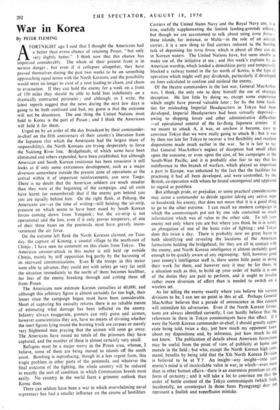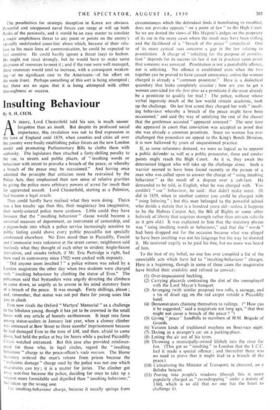War in Korea
By PETER FLEMING
AFORTNIGHT ago I said that I thought the Americans had a better than evens chance of retaining Pusan, " but only very slightly better." I think now that this chance has improved considerably. The whole of their present front is in serious danger ; but even if it collapses altogether, they have proved themselves during the past two weeks to be on something approaching equal terms with the North Koreans, and the possibility would seem no longer to exist of a rout leading to chaos, and chaos to evacuation. If they can hold the enemy for a week on a front of 150 miles they should be able to hold him indefinitely on a drastically contracted perimeter ; and although, as I write, the latest reports suggest that the news during the next few days is going to be both confused and bad, my guess is that the outcome will not be disastrous. The one thing the United Nations must hold in Korea is the port of Pusan ; and I think the Americans will hold it for them.
Urged on by an order of the day broadcast by their commander- in-chief on the fifth anniversary of their country's liberation from the Japanese (for which the Americans had the largest share of responsibility), the North Koreans are trying desperately to force the Naktong River line. Bridgeheads, of which some have been eliminated and others expanded, have been established, but although American and South Korean resistance has been tenacious it still looks as if only some extraneous development, such as a major diversion somewhere outside the present zone of operations or the arrival within it of important reinforcements, can save Taegu. There is no doubt that the American soldiers are much steadier than they were at the beginning of the campaign, and all units have learnt (or remembered) that if the enemy gets behind you you are equally behind him. On the right flank, at Pohang, the Americans are—at the time of writing—still holding the air-strip, pressure on which seems to have been eased by South Korean forces coming down from Yongdok ; but the air-strip is not operational and the loss, even if it only proves temporary, of one of their three bases on the peninsula must have gravely incon- venienced the air force.
On the extreme left flank the North Koreans claimed, on Tues- day, the capture of Kosong, a coastal village to the south-east of Chinju ; I have seen no comment on this claim from Tokyo. The American counter-attack in this sector is still held up outside Chinju, mainly by stiff opposition but partly by the harassing of its rearward communications. Even If the troops in this sector were able to advance, they could not with safety go very far until the situation immediately to the north of them becomes healthier, for fear of the enemy breaking through and cutting them off from Pusan.
The Americans now estimate Korean casualties at 60,000, and although this arbitrary, figure is almost certainly far too high, their losses since the campaign began must have been considerable. Short of capturing his casualty returns there is no reliable means of estimating what damage has been inflicted on the enemy. Infantry always exaggerate, gunners can only guess and airmen, however conscientious they are, have no means of divining whether the inert figures lying round the burning truck are corpses or merely very frightened men praying that the airmen will soon go away. The Americans have issued no totals of the prisoners they have captured, and the number of these is almost certainly very small.
Refugees must be a major worry in the Pusan area, whence, I believe, some of them are being moved to islands off the south coast. Bombing is reproducing, though in a less urgent form, this tragic problem in other parts of the peninsula, and whatever the final outcome of the fighting, the whole country will be reduced to exactly the sort of condition in which Communism breeds most easily. No country in the world faces a grimmer outlook than Korea does.
There can seldom have been a war in which overwhelming naval supremacy has had a smaller influence on the course of hostilities.
Carriers of the United States Navy and the Royal Navy are, it is true, usefully supplementing the limited landing-grounds ashore; but though we are accustomed to talk about using terra firma— these islands, for instance, or Malta—in the role of an aircraft carrier, it is a new thing to find carriers reduced to the humble task of deputising for terra firma, which is about all they can do in Korean waters. The United Nations have, but seem unable to make use of, the initiative at sea ; and this week's exploits by an American warship, which landed a demolition party and temporarily blocked a railway tunnel in the far north of Korea, is the type of operation which might well pay dividends, particularly if developed on lines calculated to confuse and mislead the enemy.
Of the theatre commanders in the last war, General MacArthur was, I think, the only one to deny himself the use of strategic deception. He lost little by doing so, except some experience which might have proved valuable later ; for by the time facili- ties for misleading Imperial Headquarters in Tokyo had been developed, Imperial Headquarters had been virtually deprived— owing to shipping losses and other administrative difficulties —of operational control of the far-flung Japanese armies. If we meant to attack A, it was, or anyhow it became, easy to convince Tokyo that we were really going to attack B ; but it was by then too late for Tokyo to recover a lost flexibility and readjust dispositions made much earlier in the war. So it is fair to say that General MacArthur's neglect of deception had small effect upon the outcome, or even upon the cost, of his campaigns in the South-West Pacific, and it is probably also fair to say that his indifference to this branch of warfare, which played so important a part in Europe, was enhanced by the fact that the facilities for practising it had all been developed, and were controlled, by the British, co-operation with whom he found uncongenial and appeared to regard as pointless.
But although pride, or prejudice, or some practical considerations may cause a commander to decide against taking any active steps to hoodwink his enemy, that does not mean that it is a good thing to go to the other extreme. I can recall no modern campaign in which the communiqués put out by one side contained so much information which was of value to the other side. To tell your enemy not only where you are but where you think he is is surely an .abnegation of one of the basic rules of fighting ; and Tokyo does this twice a day. There is probably now no great harm in both identifying and revealing the locations of the American formations holding the bridgehead, for they are all in contact with the enemy, and North Korean intelligence is almost certainly good enough to be quickly aware of any regrouping. Still, however good your enemy's intelligence staff is, there seems little point in doing their work for them, and however easy it may be for them, in a situation such as this, to build up your order of battle it is one of the duties they are paid to perform, and it ought to involve rather more diversion of effort than is needed to switch on a wireless set.
As for telling the enemy exactly where you believe his various divisions to be, I can see no point in this at all. Perhaps General MacArthur believes that a parade of omniscience in this context will intimidate his adversaries. Even if the North Korean forma- tions are always identified correctly, I can hardly believe that the references to them in Tokyo communiqués have this effect. If I were the North Korean commander-in-chief, I should greatly appre- ciate being told, twice a day, just how much my opponent knew about my dispositions and, by inference, just how much he did not know. The publication of details about American formations may be useful from the point of view of .publicity at home and morale in the field ; but who, except the North Korean high com-
mand, benefits by being told that the Xth North Korean Division is believed to be at Y ? An insight—any insight—into your enemy's mind is of incalculable value in war, in which—even more
than in other human affairs—there is an enormous premium on any form of certainty ; and it will take a lot to convince me that the order of battle content of the Tokyo communiques (which finds, incidentally, no counterpart in those from Pyongyang) does not represent a foolish and superfluous mistake.
The possibilities for strategic deception in Korea are obvious. Powerful and unopposed naval forces can range at will up both flanks of the peninsula, and it would be an easy matter to simulate a major amphibious threat to any point or points on the enemy's virtually undefended coast-line about which, because of their rela- tion to his main lines of communication, he could be expected to feel sensitive. He could hardly ignore a threat (say) to Inchon. He might not react strongly, but he would have to make some diversion of resources to meet it ; and if the ruse were well managed, these resources would tend to increase, with a consequent weaken- ing—at no significant cost to the Americans—of his effort on the main front. Perhaps something of this sort is being attempted ; but there are no signs that it is being attempted with either thoroughness or success.



































 Previous page
Previous page